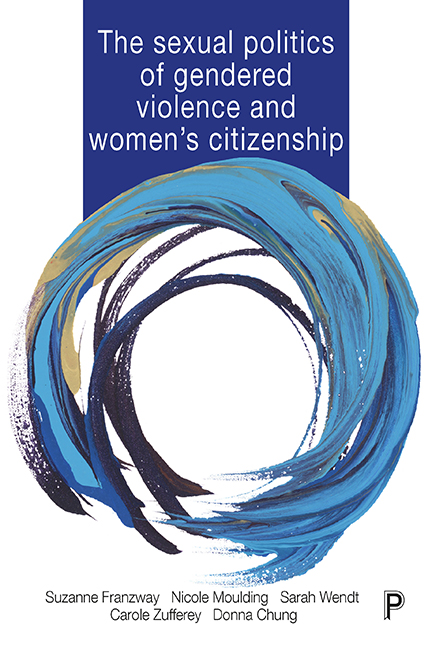Book contents
- Frontmatter
- Contents
- List of tables and figures
- Notes on authors
- Acknowledgements
- one The sexual politics of gendered violence and women’s citizenship
- two Problems of citizenship, violence and gender
- three Challenges of researching gendered violence
- four Living the connected effects of violence
- five Gendered violence and the self
- six Re-engaging lives
- seven Campaigns for women’s freedom from violence
- eight Transforming sexual politics
- References
- Index
one - The sexual politics of gendered violence and women’s citizenship
Published online by Cambridge University Press: 13 April 2022
- Frontmatter
- Contents
- List of tables and figures
- Notes on authors
- Acknowledgements
- one The sexual politics of gendered violence and women’s citizenship
- two Problems of citizenship, violence and gender
- three Challenges of researching gendered violence
- four Living the connected effects of violence
- five Gendered violence and the self
- six Re-engaging lives
- seven Campaigns for women’s freedom from violence
- eight Transforming sexual politics
- References
- Index
Summary
Introduction
Gendered violence is now such a major problem globally that the United Nations has named it as a significant violation of women's human rights and freedoms. However, men's violence against women persists even in those societies where women have formal and equal citizenship. Citizens expect their rights and freedoms to be protected and supported by the state, but statistics report that instances of gendered violence, particularly domestic violence, remain alarmingly high. In 2005, the World Health Organization (WHO) established that violence against women caused more death and disabilities among women aged 15 to 44 than cancer, malaria, traffic accidents and war combined (de Silva de Alwis, 2012). Public debates about the causes of gendered violence and the possible solutions to it are fiercely contested in both the popular media and the research and policy communities.
Studies across the world consistently show that domestic violence in the form of intimate partner violence (IPV) is largely perpetrated by male partners against female partners (Alhabib et al., 2010; Akyüz et al., 2012; Manjoo, 2014; Cox, 2015). As True (2012: 10) points out, we cannot ignore the global evidence that women and girls are more likely to be killed or injured by male partners than by any other class of individuals. Feminist perspectives on domestic violence have developed more nuanced and inclusive approaches to the problem that enhance the provision of specialist services and the efforts to eliminate or reduce violence against women (Murray, 2002). These developments have encouraged more diverse groups of women to speak about their experiences of violence, experiences which contribute to local, national and international policy and service systems (Laing and Humphreys, 2013).
Sexual politics
The view that domestic violence is closely connected with gender inequality has gained ground and is to be celebrated. However, the politics of gender inequality, and therefore of gendered violence, tends to be side-stepped. We draw on the term ‘sexual politics’, originated by Kate Millett (1969), to bring the contested arena of gender and power onto the field. We then propose the argument that sexual politics is at the centre of the refusal to challenge the political implications of the argument that gendered violence is integrally connected to gender inequality (Franzway, 2016).
- Type
- Chapter
- Information
- Publisher: Bristol University PressPrint publication year: 2018



